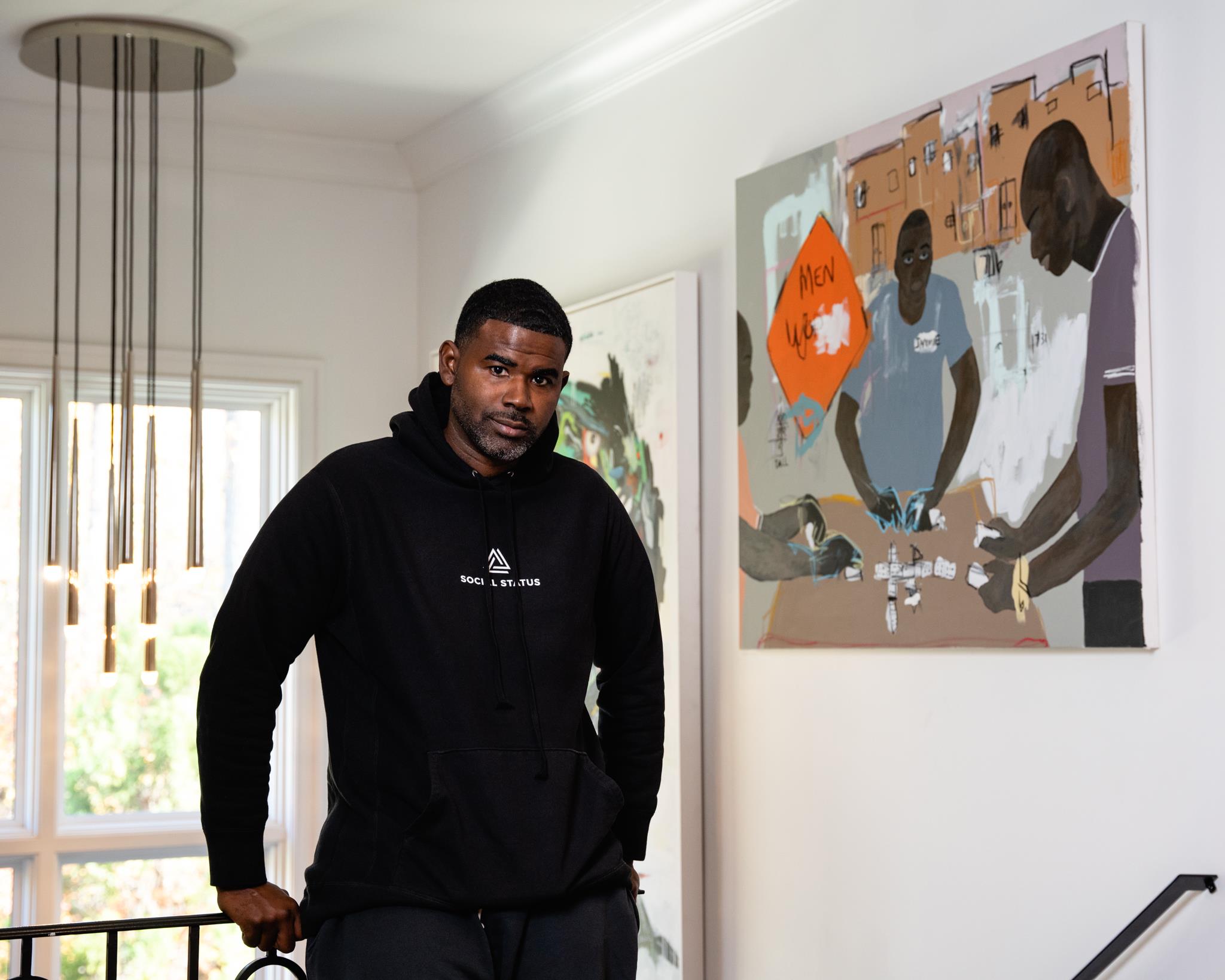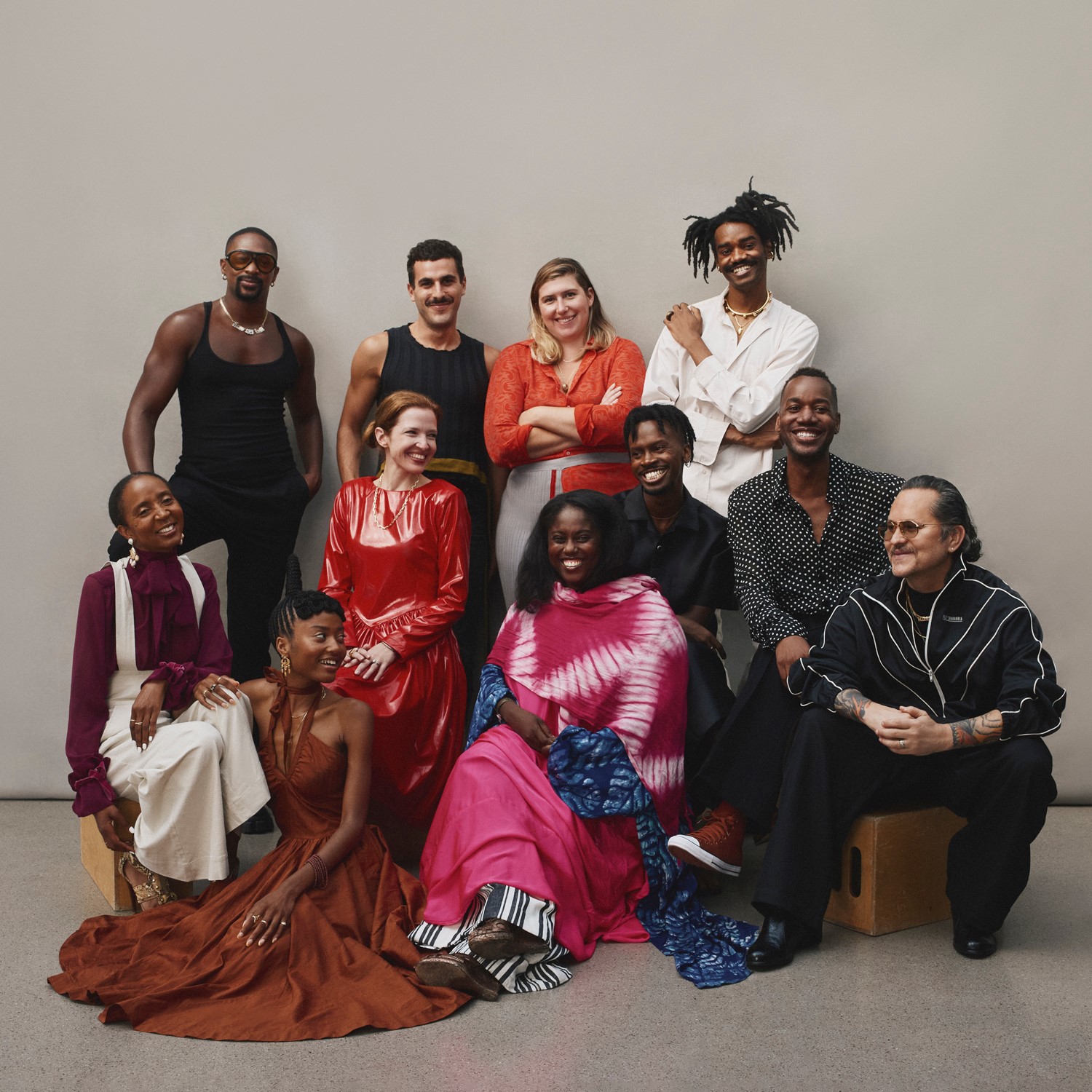Career Conversations: James Whitner on Sneaker Culture & Community
March 10, 2022
Rashad Benton


There are many tales about individuals, specifically those from the African Diaspora, who grew up in housing projects. Most people outside of the projects learned about life there via TV shows like Good Times, based on the infamous Cabrini Green in Chicago, for example. Music has also had a hand in visualizing these stories. There’s the Pork n’ Beans projects commonly known as “Da Beans” in Miami’s Liberty City that Trick Daddy highlighted in his raps and the Magnolia Projects that the “Hot Boys” popularized back in the ’90s and early 2000s.
James Whitner, owner and founder of the Whitaker Group, hails from Pittsburgh’s Mon-View Heights housing project, and is a perfect example of how these harsh environments breed resistance, perseverance, and great storytelling. He is no longer that poor boy in the Pennsylvania projects, but more of a classic luxury guy who prefers Birkin Bags and Audemars Piguet watches instead of street corner activity. Today, The Whitaker Group owns 20 individual storefronts that house luxury sneakers and clothing boutiques, a hotel, with a restaurant, and more coming. Compared to his contemporaries, James keeps a lower profile, even as the owner of Social Status, A Ma Maniere, APB, and Prosper; four various luxury, contemporary fashion and streetwear boutique concepts spread throughout the U.S.
Aside from the time he carved out to be interviewed by GQ, The Financial Times, Footwear News, and now CFDA.com, he’s working hard to build a meaningful legacy for his children. While he manages his brands, he simultaneously gives back to the less fortunate in his native Pittsburgh, where he owns and operates individual housing units for low-income families. Everybody, meet James Whitner.
How did you first become interested in footwear and where did you first come up with the idea of this conglomerate of boutique stores?
It wasn’t sneakers first; it was always about apparel, specifically Nautica sweatsuits, cargos, denim, and Nike Air Max’s. I come from the era of “getting dressed,” and sneakers accented what you wore. Today’s generation of kids accent their sneakers. Personally, sneakers were always the accessory; it was like putting a period at the end of a sentence.
Now, as to when and where I thought of this idea, there was one major problem in the way, and that issue was that I was incarcerated. I knew I needed to do something different and that I had to get away from the environment that landed me there. Once I came back to society, it took me about 18 months to move from Pittsburgh to Charlotte, draft my business plan, and sign my first lease on a space. I remember it like it was yesterday. I googled “Commercial Real Estate in Charlotte” and started dialing some numbers. I got lucky when I dialed one number, and Joey Godbald answered the phone. He sent me to two places, and I just picked one.
If you’re comfortable and have an opinion on it, talk to me about the connection between being a product of public housing and the luxury market.
The juxtaposition is crazy but think about it. When you’re piss poor, what is it that drives you? Remember a particular demographic of guys coming through your neighborhood on Saturdays back in the day. Those men were dope boy fresh, and what exactly does dope boy fresh mean? It’s the car, the fit; let’s not forget how clean his rims and shoes were. He was everybody’s role model, right. He was the north star because, in the hood, our superstars were the dope boys and basketball players. We aspired to be them because that was all we saw. Meaningful journeys and doctors and lawyers weren’t common; we didn’t see that. We saw people who went from the block to the mall, so there was always this infatuation with luxury in our culture. Look at how many black dollars drive luxury spending; it will tell you a lot.
I went to jail because no one taught me about patience. I wanted the thing, whatever it was, at that moment, I wasn’t trying to wait. Nobody told me to just keep holding on. It was more like, you don’t have any options, so here’s what you need to do. Today, I can be a role model for my kids and teach them that there’s no rush. You don’t have to have everything today; some things you will get tomorrow or next year.
What exactly is sneaker culture to you?
Sneaker culture is a community of people who just celebrate sneakers. Within that are different communities and pockets of individuals. That said, it has different meanings to varying spaces in the marketplace. For me personally, sneaker culture is a representation of Black culture. It all started with us because our people make things cool. We can go back to how we celebrated stuff in the ‘80s, which was based on how we saw and influenced the world. Now sneaker culture has expanded from our culture and spun off into several subcultures.
Back in ’07, high school students and/or their parents would camp out at the local mall at 5am on Saturdays to get the latest sneaker drop. Now things are more complicated, and those same people can hardly get sneakers at retail price anymore. What are your opinions on sneaker culture and this matter today?
It sucks. Unfortunately, any time there’s a market in anything, there will be people selling and taking advantage, and I believe today there are more sellers than wearers. I hope we can get back to a place where people are buying and wearing their shoes instead of buying the product just so they can resell and make a profit. Resellers are why people who would wear their sneakers aren’t able to get them. Bots need to be eliminated, or brands need to put more products in the marketplace so consumers can meaningfully purchase said product. There’s a happy medium to be found.
Were you nervous when you first opened the store? What was the idea behind the expansion in terms of having four separate boutiques?
I’ll answer the second question first. The reasoning behind the four separate boutiques is that the market varies in different cities and regions. I don’t have any partners and no one to provide me with capital. So, I have had to bootstrap the business, and when you’re in a position where that’s the way you have to move, you have to speak to the consumer differently depending on the location. You must be plugged in to the culture, so what that looks like in Tampa is very different from what it looks like in Atlanta.
It’s consumer segmentation and understanding what is needed in one area versus another. Now to the question of me being nervous. Nope, and I’ll default to what I said earlier about my background. I’m Project Black, and I’m not afraid of anything. “Be Broke or Hustle” is the motto, and I say this all the time “this isn’t the corner and ain’t nobody dying or going to jail.”
How would you describe the ethos behind all four? You’re not just selling sneakers; there’s apparel, and an interior design element.
Black culture in connection to the Black community is the ethos that ties Social Status, A Ma Maniere, APB, and Prosper, all four brands, together. We have a program called Color Code that supports up-and-coming Black designers, and we do whatever it takes to help bring their collections to life. We also sell their products and help them build their brands. The aesthetics and design of the different boutiques speak to who we would like to serve in the marketplace in which we exist. We’re just looking to connect aesthetically if that’s a thing. If I weren’t in retail, I’d probably be a developer/architect even though I kind of am already as I develop spaces in retail.
Tampa, Tallahassee, Jacksonville, Greenville, and Pittsburgh aren’t exactly known for their style. So, what convinced you to open boutiques in these cities?
When you think about these cities, these are places where life is happening. People are always talking about New York City and LA like folks don’t exist with purpose in the rest of the country. Places like the ones you mentioned, and Detroit, Houston, and Atlanta are real-town USA, and those markets are always overlooked. The rest of the country has a point of view, and I want to stand up for places people don’t recognize and give these cities their own voice.
I wanted not to speak to the obvious initially, so I saved this question. But you’re a Black man in America who owns luxury sneakers and clothing boutiques in several cities. Talk to me about the process, and was it hard to acquire these accounts?
Hell yeah, it was hard! People looked at me like I had two heads which I knew meant they wanted to say, “get the hell out of here.” But, like anything else, all it takes is for one person to believe in what you’re doing and for that person to take a risk on you. Obtaining accounts is getting someone to trust in you. I wouldn’t exist if there weren’t good human beings in the world. So many people talk about systemic racism and want to change it, but it really showed itself when I started this business and looked to get the accounts you see on our sites today. It took a long time to crack the code, and to be honest, I still have hurdles that I face. I spend most of my days fighting something, and I can’t tell you that my race and how people see our potential positioning in the marketplace doesn’t have something to do with it. It 100 percent still affects how individuals do business with me.
Now, am I in rooms that most people who look like me aren’t? I am. Is it still very difficult in some of those rooms? Yes, yes! It’s still tough, and we don’t have the luxury of making mistakes or second chances. We can’t dirty up our reputation because if any of those narratives get on us, we’re dead before we start.
What’s the end goal?
We currently have 20 locations in our portfolio, and we’re working on opening another 10. The end goal is to cure systemic racism the way we know and make humanity look at us differently. We do that by putting experience and culture first and holding the people we work with accountable for doing more than just selling things. It also helps that we own these spaces in most of our locations, which allows us to do almost whatever we want when it comes to including our community in specific areas and parts of town.
IG (Personal): @james.whitner
IG (Business): @thewhitakergrp
IG (Brands):
PHOTO BY THE WHITAKER GROUP @thewhitakergrp

